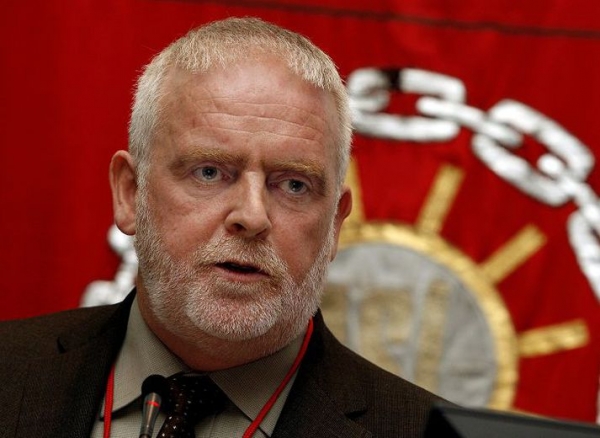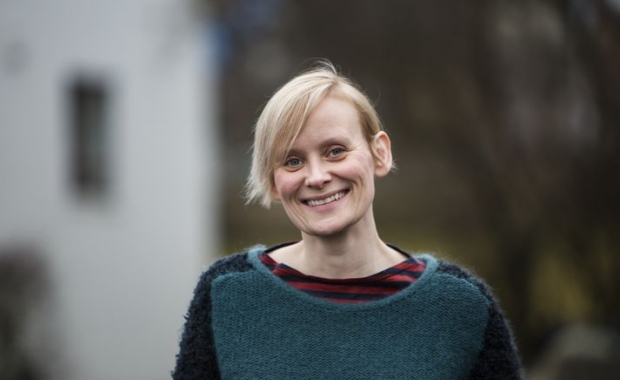Sólveig Anna Jónsdóttir, a Socialist labor organizer, has won the election to become the leader of Iceland's second largest labor union. Sólveig, and her slate of candidates, received 80% of the votes for the Union Board of Efling, a union of industrial and unskilled workers. The victory of Sólveig is a turning point in the history of the Icelandic labor movement.
Sólveig who is born in 1975 has worked at one of the public preschools of Reykjavík City. She has been active in various human rights causes and labor organizing. She was the first chairman of the Icelandic chapter of the international activist organization Attac, The Association for the Taxation of Financial Transactions and for Citizens' Action.
A large and diverse union
Efling is the second largest union in Iceland with 25,000 members. It covers numerous diverse workers, including unskilled industrial workers, numerous service sector workers and unskilled workers who are employed by the City of Reykjavík. A large part of employees in the tourism industry are also members of Efling. This includes cleaning staff at hotels, most tour-bus drivers as well as unskilled servants at restaurants, baristas and bartenders. It is also the largest union of foreign workers in Iceland. Nearly half of all the members of Efling are immigrants or foreign workers.
Read more: More jobs than workers: Foreign nationals make up 13% of the Icelandic workforce
Sólveig and her supporters argued that the union has neglected these groups, failing to represent the lowest paid workers and foreign workers. Three of the seven board members on Sólveig's slate of candidates are immigrants, Magdalena Kwiatkowska who works at downtown Café Paris, Anna Marta Marjankowska who works with the cleaning company Náttúra þrif and Jamie Mcquilkin who works with Resource International, an environmental research firm.
Foreign workers or immigrants have never before been represented on the board of a major labor union in Iceland.
Historic event

Sólveig ran to replace Sigurður Bessason, who has been the chairman of Efling for 18 years. Ingvar Vigur Halldórsson, who was picked by the current leadership of Efling to replace Sigurður had been set to run unopposed to the position when Sólveig announced her candidacy.
The victory of Sólveig and her slate of candidates represents a major turning point in the history of Icelandic labor. It represents a revival of a more radical labor organizing and a return of Socialist influences in the labor movement.
The Icelandic labor movement has historically been closely allied with the Social Democratic Party, with radical leftists being relegated to the sidelines.
Efling members who voted for Sólveig have told Iceland Insider and other local media that they felt it was time for a change in the labor movement which they feel has grown isolated from the working class and too willing to compromise with Business Iceland, the Icelandic federation of employers.

Two of Sólveig's staunchest supporters are Ragnar Þór Ingólfsson, the leader of Verslunarmannafélag Reykjavíkur VR, Iceland's largest union and Vilhjálmur Birgisson, the leader of Verkalýðsfélag Akraness, the largest union in Akranes, the largest fishing town in West Iceland.
Like Sólveig, Ragnar Þór and Vilhjálmur have struck a new more radical note in Icelandic labor organizing.
A shake-up of the Federation of Labor?

The victory of Sólveig might also signal a shake-up in the Icelandic Federation of Labor. In 2012 Ragnar Þór mounted an unsuccessful bid to unseat Gylfi Arnbjörnsson, the chairman of ASÍ, the Icelandic Federation of Labor. Gylfi enjoyed the support of Efling, which opposed Ragnar's candidacy.
If Efling, under Sólveig's leadership were to throw her support behind Ragnar Þór, it is certain Gylfi would not withstand a second challenge, as the three more radical labor unions now have a majority in ASÍ.
Sólveig Anna Jónsdóttir, a Socialist labor organizer, has won the election to become the leader of Iceland's second largest labor union. Sólveig, and her slate of candidates, received 80% of the votes for the Union Board of Efling, a union of industrial and unskilled workers. The victory of Sólveig is a turning point in the history of the Icelandic labor movement.
Sólveig who is born in 1975 has worked at one of the public preschools of Reykjavík City. She has been active in various human rights causes and labor organizing. She was the first chairman of the Icelandic chapter of the international activist organization Attac, The Association for the Taxation of Financial Transactions and for Citizens' Action.
A large and diverse union
Efling is the second largest union in Iceland with 25,000 members. It covers numerous diverse workers, including unskilled industrial workers, numerous service sector workers and unskilled workers who are employed by the City of Reykjavík. A large part of employees in the tourism industry are also members of Efling. This includes cleaning staff at hotels, most tour-bus drivers as well as unskilled servants at restaurants, baristas and bartenders. It is also the largest union of foreign workers in Iceland. Nearly half of all the members of Efling are immigrants or foreign workers.
Read more: More jobs than workers: Foreign nationals make up 13% of the Icelandic workforce
Sólveig and her supporters argued that the union has neglected these groups, failing to represent the lowest paid workers and foreign workers. Three of the seven board members on Sólveig's slate of candidates are immigrants, Magdalena Kwiatkowska who works at downtown Café Paris, Anna Marta Marjankowska who works with the cleaning company Náttúra þrif and Jamie Mcquilkin who works with Resource International, an environmental research firm.
Foreign workers or immigrants have never before been represented on the board of a major labor union in Iceland.
Historic event

Sólveig ran to replace Sigurður Bessason, who has been the chairman of Efling for 18 years. Ingvar Vigur Halldórsson, who was picked by the current leadership of Efling to replace Sigurður had been set to run unopposed to the position when Sólveig announced her candidacy.
The victory of Sólveig and her slate of candidates represents a major turning point in the history of Icelandic labor. It represents a revival of a more radical labor organizing and a return of Socialist influences in the labor movement.
The Icelandic labor movement has historically been closely allied with the Social Democratic Party, with radical leftists being relegated to the sidelines.
Efling members who voted for Sólveig have told Iceland Insider and other local media that they felt it was time for a change in the labor movement which they feel has grown isolated from the working class and too willing to compromise with Business Iceland, the Icelandic federation of employers.

Two of Sólveig's staunchest supporters are Ragnar Þór Ingólfsson, the leader of Verslunarmannafélag Reykjavíkur VR, Iceland's largest union and Vilhjálmur Birgisson, the leader of Verkalýðsfélag Akraness, the largest union in Akranes, the largest fishing town in West Iceland.
Like Sólveig, Ragnar Þór and Vilhjálmur have struck a new more radical note in Icelandic labor organizing.
A shake-up of the Federation of Labor?

The victory of Sólveig might also signal a shake-up in the Icelandic Federation of Labor. In 2012 Ragnar Þór mounted an unsuccessful bid to unseat Gylfi Arnbjörnsson, the chairman of ASÍ, the Icelandic Federation of Labor. Gylfi enjoyed the support of Efling, which opposed Ragnar's candidacy.
If Efling, under Sólveig's leadership were to throw her support behind Ragnar Þór, it is certain Gylfi would not withstand a second challenge, as the three more radical labor unions now have a majority in ASÍ.







